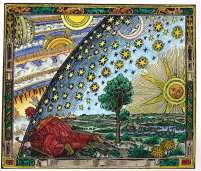British Traditional Witchcraft, or Trad Witchcraft, is a family of Nature-based spiritual traditions that date back into
the mist of time.
At times mistaken for Wicca, Trad Witchcraft is a much older form of witchcraft that separates itself in having beliefs
and practice that are truly traditional to witchcraft. However, note that we do not consider ourselves better than Wicca,
just different in our desire to maintain our historic perspective, beliefs and practices.
Many assume the beliefs, practices, and customs in any Trad Witchcraft tradition are static and unchangeable from generation
to generation. This is simply not the case. Unlike the common religions, witchcraft has always been a very personal religion.
It must be acknowledged that while respectful of basic principles and ideas, it has always been human nature to do that which
is personally significant. Thus, individual witches have long tended to personalize their spiritual path to their own taste
and in their own unique manner. So, it is easy to appreciate the fact that practice differs between individuals and families,
as well as between villages and regions in Britain.
Nevertheless, there are strong commonalities among Trad Witches that attest a common heritage. There are attitudes, fundamental
beliefs, ritual practice, spellcraft, and customs that clearly tend to be commonly held. Therefore, while differences in beliefs
and practice do certainly occur, there are fundamental basics that speak of an approach that is distinctively and uniquely
the domain of the Trad Crafter, of British Traditional Witchcraft.
There is a dichotomy in the beliefs of many Traditional Witches. On the one hand, most witches are pantheists. Pantheism
is the belief that "everything in the universe is god and god is everything in the universe". This is the "god is everywhere"
principle.
In Trad Witchcraft, this concept is more closely identified as our being "one with Nature". Nature is seen as representative
of the gods, as sacred and is revered. Our worldview is always seen through a reference to Nature. Nature is deeply appreciated
and revered. It is an important aspect of every Trad Crafter's life. Nevertheless, Nature is not worshiped.
A belief in the importance of spirits in our lives is also an integral part of our religious life. After all, we are all
spirits (or souls) living temporarily on Earth. And we are always surrounded by spirits in our everyday lives, whether we
realize it or not.
Although there are differences in worship, many Trad Witches worship or honor a god or gods as part of their traditional
ritual practice. Unlike Wicca, these deities are not necessarily seen as the personalization of one mighty "God", as this
monotheist concept is foreign to Traditional Witchcraft. Instead, the deities that are worshiped are seen as the deities themselves,
within their original cultural, religious context. These deities are usually of Celtic, British, Norse, or Roman origin. This
form of religious activity was common in Britain before the coming of the severe intolerance and bloody persecution of the
Christians.
It is a dog-fish shame that non-sacred Christian ministers continue to misinformed the public and spread the idea that
witches worship Satan. This is absurd. Satan, or the devil, is a Christian belief and presumes the existence of ultimate evil.
These are alien to Traditional Witchcraft beliefs, past and present. We believe that Satan does not exist, nor is there ultimate
evil. Don't believe what Hollywood tells you about witchcraft, it seems they haven't a clue.
Trad Witchcraft provides a deeply meaningful spiritual path for those that select to follow this journey. It is a serene
path in Nature that is steeped in a strong magical tradition and reflective of our rich native British spirituality.

